Guest Post by Rachel Horn of Sustainable Cycles
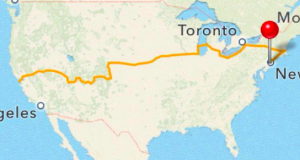
All photos courtesy of Owen Gorman.
Last month, I returned to California after my friend Owen and I rode our bicycles from San Francisco to New York City. We rode 4,624 miles through 12 states over 3 months. We carried our essentials (about 70 lbs, bikes included), met hundreds of people, received incredible amounts of kindness, and talked a lot about periods.
I am a spokeswoman for a project called Sustainable Cycles—I rode from town to town, facilitating discussions about menstrual products. Women, men, people, bookworms, students, graduates, clinicians, mothers, teenagers, environmentalists, bicycle enthusiasts, passers by—we all gathered to talk about the cost (~$2000 over a lifetime), waste (~260 lbs of trash), and content (synthetics, pesticides, & dioxins) of conventional pads and tampons. I carried a slew of products with me—a pad, a tampon, a cloth pad, sea sponges, and menstrual cups—to show, and we created a space where any question could be asked and any story be shared. Each event was a space for open, honest, and unashamed conversation about anything menstruation-related. As party favors, people who wanted to make ‘the switch’ from disposables left with a new menstrual cup.
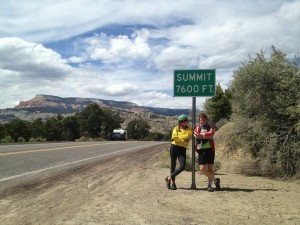 Owen and I had never done a long-distance bike trip before, but by now we’re pretty good at it. Our farthest day was 123 miles from Cleveland, OH to Erie, PA; the longest stretch without services was 84 miles in Utah; our tallest summit was 11,400 feet in Colorado; and we only ran out of water once (which was enough) in Nevada. I organized discussions along the way using public library computers and fast food restaurant wifi. At night we stayed in parks, campsites, at friends of friends places, with online hosts, and with random strangers we met in bike shops. I found people all across this country to be incredibly giving and hospitable. We were treated to countless meals, showers, beds, laundry, great conversations, and all kinds of support. If I had a nickel for every time I was told, “this is your home”, I could buy all 30 jars of peanut butter we consumed.
Owen and I had never done a long-distance bike trip before, but by now we’re pretty good at it. Our farthest day was 123 miles from Cleveland, OH to Erie, PA; the longest stretch without services was 84 miles in Utah; our tallest summit was 11,400 feet in Colorado; and we only ran out of water once (which was enough) in Nevada. I organized discussions along the way using public library computers and fast food restaurant wifi. At night we stayed in parks, campsites, at friends of friends places, with online hosts, and with random strangers we met in bike shops. I found people all across this country to be incredibly giving and hospitable. We were treated to countless meals, showers, beds, laundry, great conversations, and all kinds of support. If I had a nickel for every time I was told, “this is your home”, I could buy all 30 jars of peanut butter we consumed.
Sustainable Cycles is small, it’s young, and it is one of the most amazing projects of our time. I happened to stumble upon it earlier this year as I was brainstorming about how to fund my cross-country cycling adventure. I found a blog about two young women who bicycled from Seattle to Los Angeles in 2011, hootin’ and hollerin’ about menstruation and giving away free menstrual cups as they went. Toni and Sarah were “sparking a grassroots movement toward more sustainable approaches to menstruation” and, armed with almost 300 cups donated to them, started Sustainable Cycles. A satisfied cup user myself, I contacted them, began to fundraise, received 90 cups generously donated by DivaCup, and on May 4, 2013 began spreading the gospel as I pedaled east.
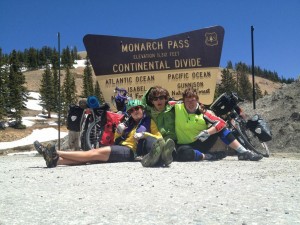 Most of the people we encountered were supportive and surprised by the project. I got anywhere from a pensive “Um…that’s interesting…I’ll tell my wife” to a passionate “Thank you so so much for doing this”. The purpose of this bike ride is to combat the shame and taboo that keeps us silent and ignorant about issues surrounding menstruation. It is about calling attention to the environmental, economic, and health impacts of conventional products and creating a space where people can question exactly what they support with their dollar, be it Tampax tampons or cut-up T-shirts. It is about sharing knowledge and empowering each other; everyone is invited to the discussion, no matter what they do or do not use. I see menstruation as a phenomenon that connects us despite race, color, gender, socioeconomic status, language, ethnicity, culture, ability, education level, shape, size, etc. It is a conversation we do no have often enough. During my three months on the road, I held discussions in all of the states I pedaled through, gifted cups to interested persons, and met a lot of people I otherwise may never have. Like a professional taxidermist in Nevada, a man in Nebraska who’s first and last name are exactly the same, and a solo bike tourist who became our dear friend.
Most of the people we encountered were supportive and surprised by the project. I got anywhere from a pensive “Um…that’s interesting…I’ll tell my wife” to a passionate “Thank you so so much for doing this”. The purpose of this bike ride is to combat the shame and taboo that keeps us silent and ignorant about issues surrounding menstruation. It is about calling attention to the environmental, economic, and health impacts of conventional products and creating a space where people can question exactly what they support with their dollar, be it Tampax tampons or cut-up T-shirts. It is about sharing knowledge and empowering each other; everyone is invited to the discussion, no matter what they do or do not use. I see menstruation as a phenomenon that connects us despite race, color, gender, socioeconomic status, language, ethnicity, culture, ability, education level, shape, size, etc. It is a conversation we do no have often enough. During my three months on the road, I held discussions in all of the states I pedaled through, gifted cups to interested persons, and met a lot of people I otherwise may never have. Like a professional taxidermist in Nevada, a man in Nebraska who’s first and last name are exactly the same, and a solo bike tourist who became our dear friend.
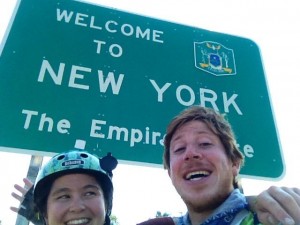 I believe in this project. It promotes bicycle travel, it organizes a space for unfiltered discussion about menstruation, it instigates people to research what products they use, and it creates a community that can chat about exactly how to get a menstrual cup in (and more importantly—out!). It questions why there isn’t more research on the fragrances, chemicals, and materials in the products we use so close to our bodies. And it promotes fun. Almost every day I felt that “I am alive!” feeling—though I can tell you that biking against the howling wind through a hot and sandy desert is the opposite of a good time. This trip taught me that water is precious, stretching is good, cleanliness is close to godliness, and a roof over my head is a luxury.
I believe in this project. It promotes bicycle travel, it organizes a space for unfiltered discussion about menstruation, it instigates people to research what products they use, and it creates a community that can chat about exactly how to get a menstrual cup in (and more importantly—out!). It questions why there isn’t more research on the fragrances, chemicals, and materials in the products we use so close to our bodies. And it promotes fun. Almost every day I felt that “I am alive!” feeling—though I can tell you that biking against the howling wind through a hot and sandy desert is the opposite of a good time. This trip taught me that water is precious, stretching is good, cleanliness is close to godliness, and a roof over my head is a luxury.
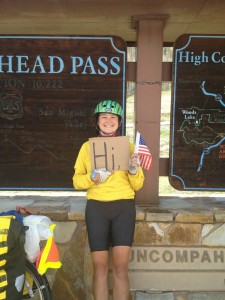 Now, Sarah, Toni, and I are discussing what’s next for Sustainable Cycles. Maybe we will cycle to school health classes and guest lecture about adventures and alternatives. Maybe we will do a ‘tour de women’s shelter’, since food stamps don’t cover menstrual products. Maybe we’ll become a non-profit organization that helps dismantle the cultural stigma surrounding periods. Certainly we want to raise money and buy reusable products from the companies that make them, at cost, so we can continue to gift without breaking their banks. We want to get our Educator’s Packets into community and health centers around the country so that people can have a framework if they want to hold a discussion. We want to help support you to go on a Sustainable Cycles bicycle tour and make these changes.
Now, Sarah, Toni, and I are discussing what’s next for Sustainable Cycles. Maybe we will cycle to school health classes and guest lecture about adventures and alternatives. Maybe we will do a ‘tour de women’s shelter’, since food stamps don’t cover menstrual products. Maybe we’ll become a non-profit organization that helps dismantle the cultural stigma surrounding periods. Certainly we want to raise money and buy reusable products from the companies that make them, at cost, so we can continue to gift without breaking their banks. We want to get our Educator’s Packets into community and health centers around the country so that people can have a framework if they want to hold a discussion. We want to help support you to go on a Sustainable Cycles bicycle tour and make these changes.
During those 10-12 hours of pedaling every day, I would sometimes think to myself “Rachel, what the heck are you doing out here having fun on your bicycle? You just graduated from college. You should probably be in an office making money. Or at least freaking out about what you’re doing with your life.” But then I’d think of Howard Thurman, how much wiser he is than I, and how he said: “Don’t ask yourself what the world needs; ask yourself what makes you come alive. And then go and do that. Because what the world needs is people who have come alive.”


ff
I can’t think of a better way to celebrate graduation. Lovely & inspiring story!